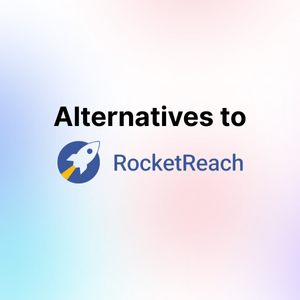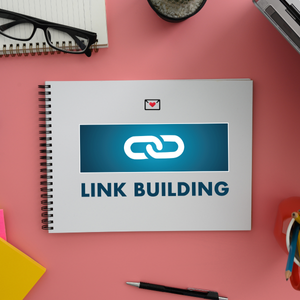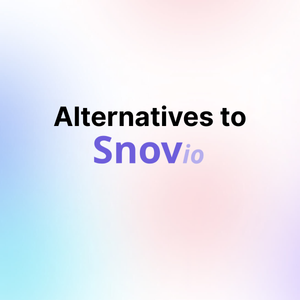Your sales team spent three hours building a lead list yesterday. They filtered by industry, company size, job title. Result? 200 generic contacts. Half probably aren't even the right decision-makers.
Meanwhile, your competitor asked an AI lead finder by describing the company they would like to target: "Insurance carriers and MGAs in the US between 50 and 500 employees offering trade credit or surety underwriting and digital insurance products" They selected CTO as their target role and, few minutes later, they had 50 hyper-targeted companies with verified CTO emails ready to go.
That's the difference between traditional databases and real AI discovery. This guide breaks down which tools actually use AI to find leads, and which ones just slapped "AI" on their database search.
Best AI B2B Lead Finder Tools : Quick Comparison
| Tool | AI Type | Best For | Starting Price | Standout Feature |
| Findymail (Intellimatch) 🏆 | Generative AI Discovery | Real-time lead discovery with natural language | $49/mo | Discovers leads beyond databases using AI |
| Instantly.ai B2B Lead Finder | Database + AI Filtering | High-volume cold email campaigns | $47/mo | Combines lead database with email automation |
| Amplemarket Searcher | Predictive AI + Intent Signals | Intent-based prospecting | Custom pricing | AI-powered buyer intent identification |
| Copilot AI | AI-Assisted Research | Complex, high-value accounts | Custom pricing | Human + AI hybrid prospecting |
| Clay (Claygent) | Generative AI Research | Custom enrichment workflows | $149/mo | AI agent that researches leads like a human |
| Seamless.AI | Real-time AI Search | Finding direct dials + emails | $147/mo | AI-powered phone number discovery |
Top 6 AI B2B Lead Finder Tools in 2025
1. Findymail (Intellimatch): Best for AI-Powered Lead Discovery
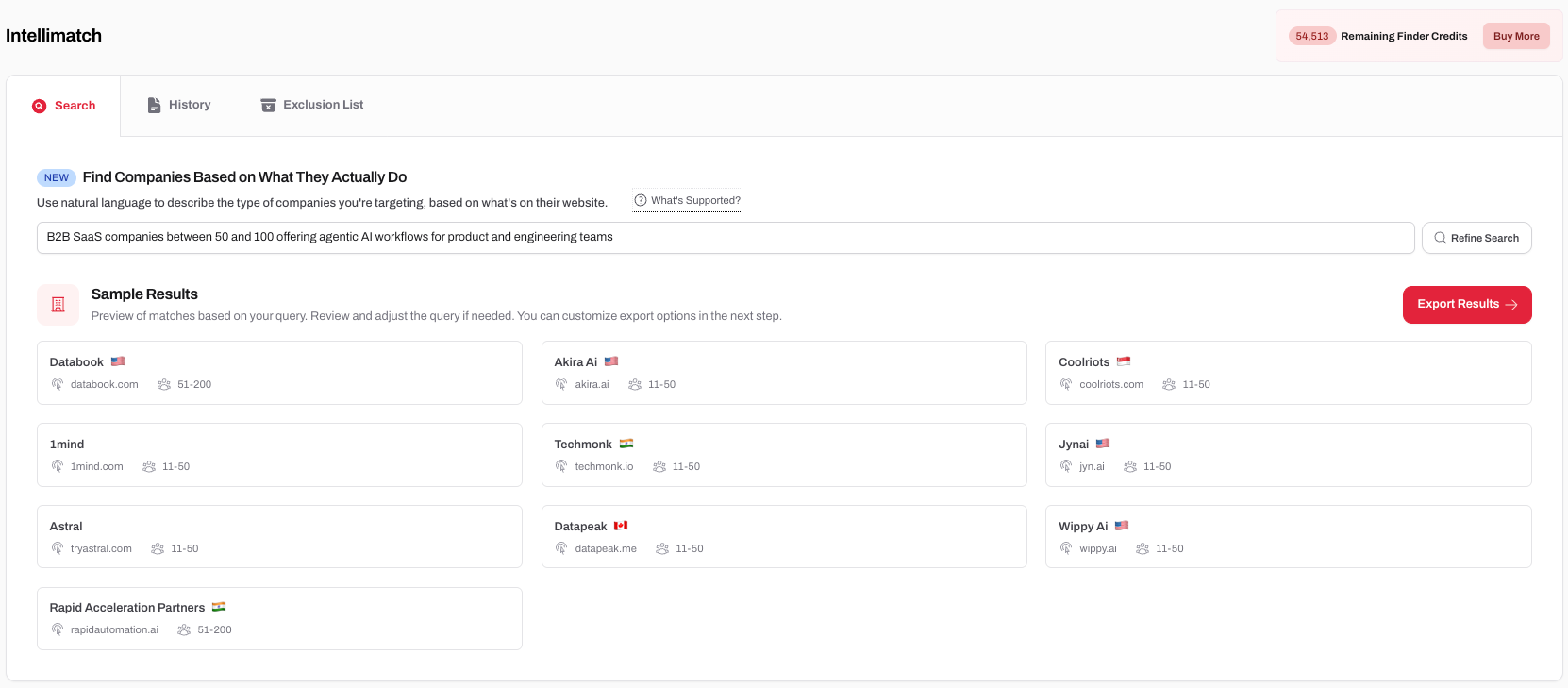
Most "AI lead finders" just help you filter existing databases faster. Findymail's Intellimatch actually uses generative AI to discover leads in real-time by understanding what you're looking for in natural language.
Let's say you're targeting the founder of “B2B SaaS companies between 10 and 50 employees offering agentic AI workflows for product and engineering teams”. Instead of filtering through a massive list of software companies and manually visiting every site to figure out which ones actually sell to product teams and use agentic AI, you describe your ideal lead in plain English. Intellimatch interprets your intent, searches across multiple data sources in real-time, and discovers leads that traditional databases would miss - including people who just changed roles last week.
Where Intellimatch Fits: Use it at the very beginning of your prospecting process when you need to identify net-new leads that fit specific, nuanced criteria. It's especially powerful for targeting emerging markets or rapidly changing industries where traditional databases lag behind.
Pricing: Starts at $49/month
Key Features: Natural language search, real-time AI discovery across the web, verified email finding + verification in one workflow, LinkedIn Sales Navigator integration, CRM enrichment with AI-powered data.
Pros: Discovers leads that don't exist in traditional databases yet, 98%+ email accuracy because verification happens in real-time, pay only for verified emails found, finds decision-makers of companies based on what they do, not just industries and company sizes.
Best for: Sales teams targeting emerging markets, new job functions, or leads with specific buying signals that traditional filters can't capture.
2. Instantly.ai B2B Lead Finder: Best for High-Volume Cold Email
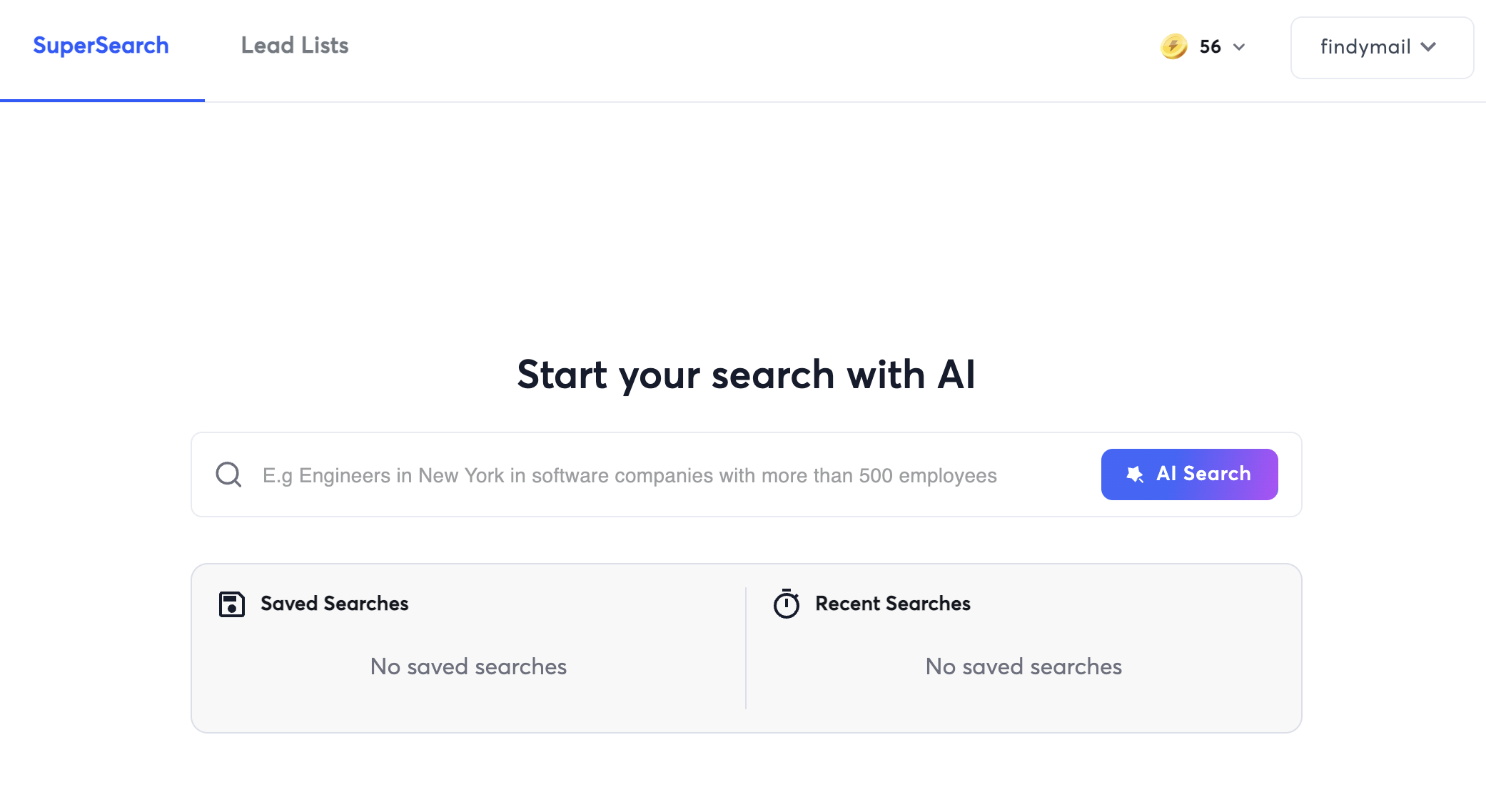
Instantly combines a 160M+ lead database with AI-powered filtering, but the real value is how tightly it integrates with their cold email automation platform.
Use Instantly when you need volume prospecting for cold outreach campaigns. It works best after you've defined your ICP and want to quickly pull thousands of leads that match basic firmographic criteria, then immediately load them into email sequences.
Pricing: $47/month for lead access (separate from email automation plan)
Key Features: 160M+ B2B contact database, AI-enhanced filtering for job titles and tech stack, one-click export to Instantly email campaigns, email verification included, buying intent signals.
Pros: Massive database for volume prospecting, seamless workflow from lead finding to email sending, competitive pricing for database access, good for straightforward ICP targeting.
Cons: Database accuracy can vary, AI features are more about filtering than discovery, requires separate subscriptions for leads plus automation.
Best for: SDR teams running high-volume cold email campaigns with clear, simple ICPs.
3. Amplemarket Searcher: Best for Intent-Based Prospecting
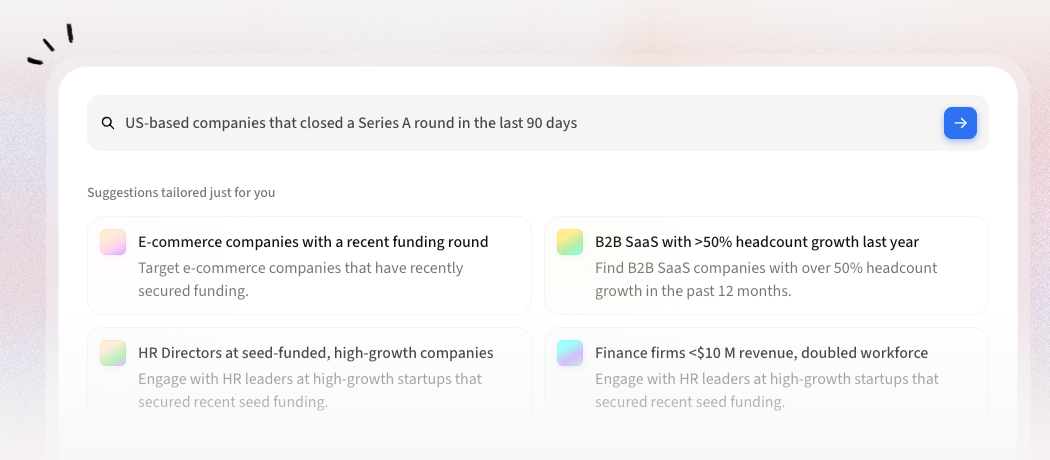
Amplemarket's AI doesn't just find leads - it identifies which leads are actually in-market right now based on buying signals.
You could target every CMO at a Series B company, or you could target CMOs at Series B companies who just hired three new demand gen specialists, posted a job for marketing ops, and visited your pricing page twice last week. That's intent-based prospecting.
Use Amplemarket when timing matters more than volume. It's built for account-based sales where you want to engage prospects when they're actively researching solutions.
Pricing: Custom (typically $400+/month for full platform)
Key Features: Predictive AI scoring based on 50+ buying signals, job change alerts and hiring triggers, tech stack intelligence, website visitor identification, multi-channel engagement tracking.
Pros: Prioritizes leads actually in-market with higher conversion rates, reduces wasted outreach on cold prospects, strong data accuracy for US-based companies, native integration with major CRMs.
Cons: Premium pricing puts it out of reach for small teams, intent signals work best for established product categories, learning curve to interpret and act on signals effectively.
Best for: Mid-market and enterprise sales teams with longer sales cycles who need to time their outreach based on buyer readiness.
4. Copilot AI: Best for High-Touch Research
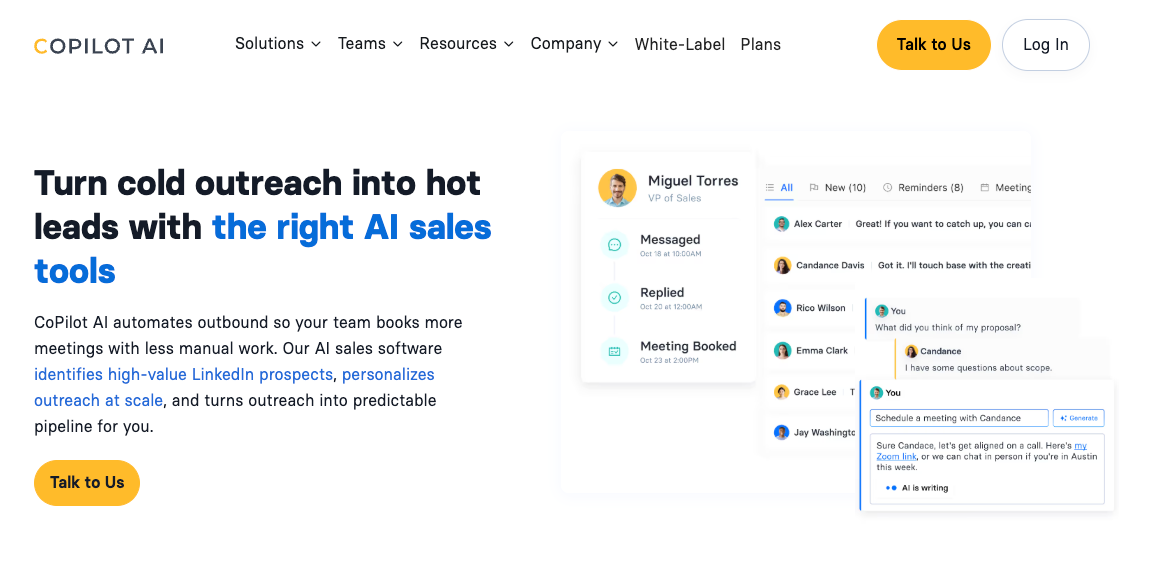
Copilot AI takes a hybrid approach - combining AI automation with human verification for complex, high-value accounts.
Instead of just returning a list of leads, Copilot's AI agents actually research each prospect. They check LinkedIn, company news, tech stack, and recent hires to compile detailed profiles. A human then verifies the AI's work before delivering the final list.
Use Copilot when you're targeting a small number of high-value accounts where personalization and accuracy matter more than speed. It's overkill for high-volume prospecting.
Pricing: Custom (typically $2,000+/month depending on volume)
Key Features: AI plus human hybrid research model, deep account profiling with tech stack and org charts, custom research based on your specific criteria, verified contact information, personalization insights for each lead.
Pros: Highest data accuracy because humans verify AI findings, deep research that goes beyond surface-level data, flexible for very specific or unusual research requests, includes personalization insights for outreach.
Cons: Premium pricing model cost-per-lead, slower turnaround than fully automated tools, not practical for high-volume prospecting.
Best for: Enterprise sales teams closing six-figure deals who need deeply researched accounts with bulletproof accuracy.
5. Clay (Claygent): Best for Custom Enrichment Workflows

Clay's Claygent is an AI research agent that can be programmed to find and enrich leads using custom workflows you design.
Imagine you want to find "B2B companies that recently changed their pricing page from annual-only to monthly plans." That's not a filter you'll find in any database. But you could build a Claygent workflow that monitors company websites, detects pricing changes, identifies decision-makers, and enriches their data—all automatically.
Clay is for sophisticated sales ops teams who want to build custom lead-finding and enrichment workflows that go beyond what pre-built tools offer. You need some technical chops, but the flexibility is unmatched.
Pricing: Starts at $149/month (scales with usage)
Key Features: Claygent AI research agent that scrapes and analyzes web data, 75+ native data enrichment integrations, custom workflow builder with no-code options, waterfall enrichment that tries multiple data sources automatically, AI-powered data formatting and cleaning.
Pros: Incredibly flexible for building almost any lead-finding workflow, combines multiple data sources for better coverage, AI can research and summarize unstructured data like blog posts, growing community sharing workflow templates.
Cons: Steeper learning curve than plug-and-play tools, can get expensive as usage scales, requires time investment to build and maintain workflows.
Best for: Sales ops and revenue ops teams who want to build competitive advantages through custom lead discovery and enrichment processes.
6. Seamless.AI: Best for Finding Phone Numbers

While most AI lead finders focus on email discovery, Seamless.AI's real strength is finding direct dial phone numbers in real-time.
The AI searches across multiple data sources simultaneously and verifies phone numbers on-the-fly, which means you're getting the most current contact info possible - not what was accurate six months ago when it was added to a database.
Use Seamless when your sales motion relies heavily on cold calling or when you need both email and phone for multi-channel outreach. It's particularly strong for US-based B2B contacts.
Pricing: Starts at $147/month
Key Features: Real-time AI-powered phone number discovery, Chrome extension for LinkedIn and Sales Navigator prospecting, email finding plus verification, AI-powered lead recommendations, CRM integration with Salesforce and HubSpot.
Pros: Best-in-class for finding direct dials, real-time verification not stale database data, generous credit limits compared to competitors, active user community.
Cons: Data accuracy can be inconsistent outside the US, Chrome extension can be buggy, customer support responsiveness varies.
Best for: Sales teams that rely on cold calling and need verified phone numbers alongside email addresses.
How to Choose the Right AI Lead Finder
The "best" AI lead finder depends on your specific needs. But here's what separates tools that actually deliver from those that just claim to use AI.
Most tools with "AI" in their name are just helping you search faster through the same databases everyone else uses. That means you're competing for the same leads as your competitors. Real AI discovery finds leads that aren't in those databases yet - giving you first-mover advantage.
The criteria that actually matter:
Discovery vs. Filtering Are you finding new leads or just searching existing databases faster? If your tool requires you to click through 15 filter dropdowns, you're filtering—not discovering. Real AI understands "find CTOs who just raised Series B and are hiring sales ops" in natural language and goes out to discover those leads in real-time.
Data Freshness Database tools brag about "275 million contacts!" but data decays at roughly 30% per year. Job changes, company moves, email migrations—all of it makes yesterday's data less accurate today. Real-time discovery finds and verifies contacts on-the-spot, which is why teams switching from databases to tools like Findymail see bounce rates drop from 15-20% to under 2%.
Pay-Per-Result vs. Pay-Per-Credit Some tools charge you whether they find an email or not. You burn credits on searches that come back empty. Others like Findymail only charge for verified, valid emails actually found. That difference adds up fast when you're prospecting at scale.
Natural Language vs. Rigid Filters Can you describe your ideal lead the way you'd explain it to a colleague? Or do you need to translate your thinking into job title filters, seniority levels, company size ranges, and industry codes? The former is AI understanding intent. The latter is just a fancy database search.
Here's what most teams miss: They optimize for database size rather than data quality. A massive database sounds impressive—until you realize 40% of those emails bounce and you've just tanked your sender reputation.
With Findymail's Intellimatch, you're not pulling from a stale database everyone else has access to. You're discovering leads as they become relevant, with real-time verification built in. That's why sales teams using it report 95%+ email accuracy versus the 60-75% industry average, 3-5 hours saved per week on manual research, and first contact with leads before competitors even know they exist.
The simple decision framework:
Do I need leads nobody else has access to? If yes, you need real AI discovery, not database filtering.
Is my ICP straightforward or nuanced? Simple ICPs like "Marketing Directors at 50-200 employee companies" work fine with basic filters. Nuanced ICPs like "heads of revenue ops at B2B SaaS companies who recently switched from HubSpot to Salesforce" need AI that understands context.
What's more valuable: 500 decent leads or 50 perfect leads? If you answered the latter, optimize for accuracy over volume. Fifty verified, hyper-targeted leads convert better than 500 generic ones.
Most sales teams end up using Findymail for discovery and verification, then connecting it to their CRM and outreach tools. That way, you get AI-powered lead finding with verified contact data flowing directly into your existing workflows.
The Bottom Line
AI is transforming B2B lead generation, but not all AI lead finders are created equal. Some just add AI labels to traditional databases. Others genuinely use AI to discover leads in ways that weren't possible before.
If you're tired of generic lead lists that everyone else has access to, try Findymail's Intellimatch. Describe your ideal lead in natural language, and let the AI discover prospects in real-time (verified emails included).
You'll get 10 free credits to test it out. No credit card required. Just leads you won't find anywhere else.
FAQs About AI B2B Lead Finder Tools
What's the difference between different types of AI lead finders?
Generative AI like Findymail's Intellimatch discovers new leads from real-time web sources using natural language. You describe what you're looking for, and it goes out and finds leads that match - even if they're not in existing databases yet. Predictive AI like ZoomInfo or 6sense analyzes intent signals to identify which leads are ready to buy. Database AI like Apollo uses machine learning to filter existing databases more efficiently. Choose based on whether you need discovery, intent identification, or volume filtering.
How accurate are AI-powered lead finders?
Accuracy varies dramatically. Real-time AI discovery tools like Findymail achieve 95-99% accuracy by finding and verifying contacts on-demand. Traditional database tools with AI features vary from 60-90% because data ages quickly. Always verify claimed accuracy rates during trials by sending test emails to a sample of contacts and tracking bounce rates.
Can AI lead finders replace manual prospecting?
AI automates research and initial discovery, but human judgment remains crucial for relationship building, complex qualification, and strategic decisions. Think of it this way: AI can tell you that Jane Doe just became VP of Sales at Company X and they're hiring aggressively in Q1. But only you can craft the right message that speaks to Jane's specific challenges. The best approach combines AI efficiency with human expertise.
Which AI lead finder is best for startups on a budget?
Findymail with Intellimatch offers the most advanced AI discovery at startup-friendly pricing starting at $49/month. You get natural language search, real-time finding, and verified emails without enterprise costs. Plus, you only pay for emails actually found and verified—not for searches or credits wasted on emails that don't exist. For the best ROI, invest in a tool that delivers quality over quantity.
How do I know if a tool's AI actually works?
Request a live demo where you describe your ICP and watch the AI find leads in real-time. Don't settle for pre-recorded demos with cherry-picked examples. Ask how the AI interprets natural language, for proof of real-time discovery versus database filtering, examples of leads found that manual searches would miss, and documented accuracy from third-party testing. Demand evidence, not marketing claims.
Do AI lead finders comply with GDPR?
The best AI tools like Findymail, Cognism, and ZoomInfo are fully GDPR-compliant with proper consent mechanisms, opt-out management, and clear data sourcing. Verify where the data comes from, how they handle data subject rights, their data retention policy, and whether they have documented compliance certifications. Non-compliant AI tools expose you to significant legal and financial risks, especially when targeting EU contacts.




